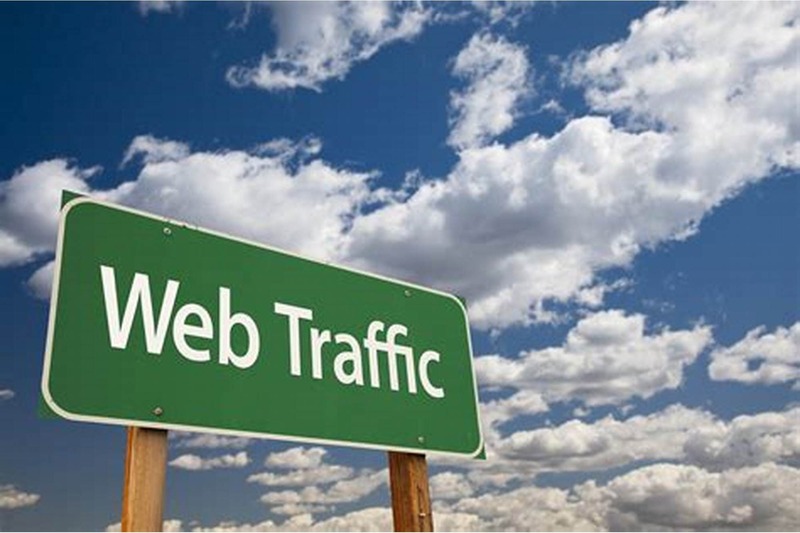Website traffic refers to the number of visitors and visits a site receives over a specific period of time. It’s a measure of how much activity occurs on a particular website.
This is measured in terms of the number of unique visitors, page views, sessions, or other metrics.
Pageviews on the other hand, means the number of times a webpage has been viewed by a user. Unique visitors refer to the number of individual users who have visited a given site during a specific time period.
However, the period of time that a user spends on a website before leaving or closing it is what is known as a session. Sometimes a visitor views only the page and leaves the site. This is termed as a bounce rate and it is measured in percentage.
Web traffic is important for site owners and businesses because it can help them track the effectiveness of their online presence, monitor user behaviour, and make informed decisions about their website design, content, and marketing strategies.
There are three types of website traffic namely; organic traffic, paid traffic, and a little talked about direct traffic.
Categories of Website Traffic
- Organic Traffic
- Paid Traffic
- Direct Traffic
- Referral Traffic
- Social Traffic
Organic Traffic
Organic website traffic refers to the traffic that a site receives from search engines or other sources without the use of paid advertising.
This traffic is generated by users who find the site through search engines like Google or Microsoft Bing, social media platforms, or other websites that link to it.
Organic traffic is considered high-quality traffic because users who find a website through organic search are typically looking for specific information or solutions that the website can provide.
It is also considered to be more valuable than paid traffic because it is free and can generate leads and sales over a longer period of time.
To increase organic website traffic, site owners can focus on Search Engine Optimization (SEO), which involves optimizing the website’s content, structure, and keywords to rank higher in search engine results pages (SERPs).
This can be achieved through strategies such as keyword research, creating high-quality content, building backlinks, and improving website speed and user experience.
Other tactics to increase organic traffic include social media marketing, email marketing, and content marketing.
To find out how you can generate more traffic to your website, read How to Increase Traffic to Your Website
Paid Traffic
Paid website traffic refers to the traffic generated by paid advertising campaigns or sponsored content on search engines, social media platforms, or other sites. It involves paying for online advertising services to promote a given site or specific pages on it.
Paid website traffic can come in different forms, such as pay-per-click (PPC) advertising, display ads, social media advertising, and influencer marketing.
With PPC advertising, advertisers pay for each click on their ads, while display ads are visual ads that appear on websites and social media platforms.
Social media advertising involves promoting a website or its content through social media channels such as Facebook, Twitter, and Instagram.
Influencer marketing involves partnering with social media influencers to promote a website or its content to their followers.
Paid website traffic can be an effective way to drive traffic to a website and generate leads. This true especially for businesses looking to increase their online visibility or launch new products or services.
However, it can also be expensive and requires careful planning and execution to ensure a good return on investment (ROI).
Direct Traffic
Direct web traffic refers to the traffic that a site receives when users type the site’s URL directly into their web browser or click on a bookmarked link to the website.
This type of traffic is also referred to as “direct navigation” or “type-in traffic.”
Direct traffic is a result of users who are already familiar with the website or have previously visited it and have saved the website’s URL in their browser bookmarks.
This traffic can be generated by users who are referred to the website through word-of-mouth recommendations, offline advertising, or other non-online channels.
Direct website traffic is an important metric for website owners and marketers because it can indicate the website’s brand awareness and user loyalty.
High levels of direct traffic suggest that users are familiar with the website and trust its content, products, or services.
It can also indicate a strong online and offline marketing strategy that effectively promotes the website’s brand and message to the target audience.
Referral Traffic
This comprises visitors who arrive at a website through external links on other websites, not from search engines or directly typing the URL.
These links can originate from blog posts, articles, social media, or other online sources. Referral traffic is valuable for increasing a website’s visibility and building relationships with other online platforms.
Social Traffic
Social traffic refers to visitors who land on a site via social media platforms such as Facebook, Twitter, Instagram, LinkedIn, and others. When users click on links shared on social networks, it is generated.
Social traffic is vital for boosting brand exposure, and engagement, and driving targeted audiences to specific content or promotions.
Benefits of Website Traffic
Web traffic can be very helpful for website owners and businesses in a number of ways including but not limited to the following:
- Measure website performance
- Increase brand awareness
- Improve search engine ranking
- Generate leads and sales
- Identify new opportunities
Measure website performance
It allows site owners to measure the performance of their website and identify areas for improvement.
Website owners can evaluate the effectiveness of their content, marketing campaigns, and user experience. This done by tracking web traffic and engagement metrics,
Increase brand awareness
High traffic can increase brand awareness and visibility by exposing the website and its content to a larger audience.
This can help generate interest, leads, and sales for businesses.
Improve search engine ranking
A site’s traffic can also have a positive impact on search engine ranking. Search engines like Google use these metrics as a ranking factor. Higher metrics indicate higher relevance and authority for the website.
Generate leads and sales
It can also be a valuable source of leads and sales for businesses. By driving targeted traffic to their website, businesses can increase their chances of converting visitors into customers.
Identify new opportunities
Analyzing traffic data can help businesses identify new opportunities and trends in their market.
Businesses can develop new products or services, refine their marketing strategy, and expand their customer base. This is possible if they understand the interests and behaviours of their site visitors,
Takeaway
Web traffic is a crucial metric for site owners and marketers. It helps them understand the popularity, reach, and effectiveness of their websites.
Analyzing traffic data allows the owners to make informed decisions about content strategy, marketing campaigns, user experience improvements, and more.




